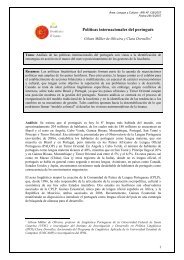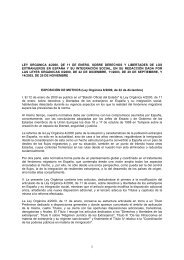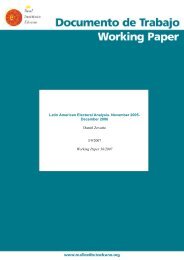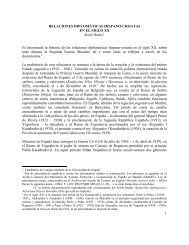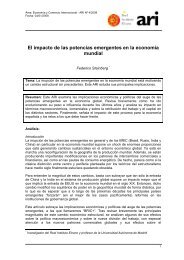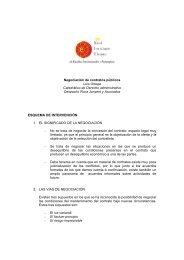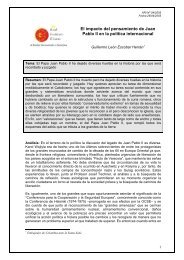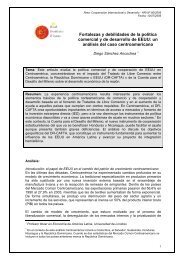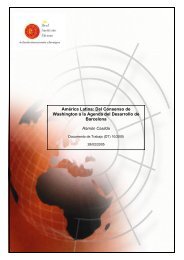Spain and the United States - Real Instituto Elcano
Spain and the United States - Real Instituto Elcano
Spain and the United States - Real Instituto Elcano
You also want an ePaper? Increase the reach of your titles
YUMPU automatically turns print PDFs into web optimized ePapers that Google loves.
Exhibit 4.6 Ford’s Exports of Vehicles, 1976-2004<br />
FOREIGN TRADE 79<br />
preparatory work in many sectors by <strong>Spain</strong>’s trade authorities – <strong>the</strong> Secretariat<br />
of Trade, <strong>the</strong> Spanish Institute of Foreign Trade (ICEX) <strong>and</strong> trade offices in <strong>the</strong><br />
<strong>United</strong> <strong>States</strong>. ICEX spent 16% of its global marketing budget in <strong>the</strong> <strong>United</strong><br />
<strong>States</strong> in 2004, four times <strong>the</strong> US share of <strong>Spain</strong>’s total exports. Breaking into<br />
<strong>the</strong> US market requires more initial investment in advertising, sales networks,<br />
direct marketing, point-of-sale promotions <strong>and</strong> public relations than any of <strong>the</strong><br />
European markets, all of which are closer, cheaper to service, <strong>and</strong> easier to<br />
export to. Some firms believe <strong>the</strong>y can come on a single mission, go to one<br />
trade fair <strong>and</strong> start generating sales. This is not <strong>the</strong> way. It is generally agreed<br />
that <strong>the</strong> most important thing to do first is to find an importer, representative or<br />
agent <strong>and</strong> nurture that relationship. Forming a joint venture often helps to<br />
sustain <strong>the</strong> business relationship.<br />
The US business culture is very different. For example, Spanish companies<br />
are reluctant to give US importers <strong>the</strong> prices of <strong>the</strong>ir products before <strong>the</strong> first<br />
meeting. This can lead to <strong>the</strong> client refusing to see <strong>the</strong> Spanish firm. Spaniards<br />
prefer to discuss prices during <strong>the</strong>ir first contact as <strong>the</strong>y believe it gives <strong>the</strong>m<br />
flexibility to negotiate upwards or downwards, but this is a tactic that US<br />
buyers do not like, as <strong>the</strong>y want to know where <strong>the</strong>y st<strong>and</strong> right from <strong>the</strong> start.<br />
Spanish exporters tend to test <strong>the</strong> waters badly prepared, according to trade<br />
experts on <strong>the</strong> ground. Catalogues, labels <strong>and</strong> adverts are often badly translated<br />
into English. The regional government of Navarra, for example, raised many a<br />
laugh among <strong>the</strong> cognoscenti when it placed an advert in Time Out in February<br />
2005 to publicise <strong>the</strong> participation of top chefs in New York’s gastronomic<br />
week. The advert was headed “Spanish fly”, an unfortunate expression<br />
because, among o<strong>the</strong>r meanings, it was <strong>the</strong> Mediterranean fruit fly that led to a<br />
ban on Spanish exports of tomatoes <strong>and</strong> citrus fruits. In ano<strong>the</strong>r advert, <strong>the</strong><br />
Madrid Chamber of Commerce placed a very expensive advert for fashion in<br />
<strong>the</strong> New York Times in 2004 that said, “In <strong>Spain</strong> fashion is with a capital M”.<br />
Americans were totally baffled. This was a play on words that worked in



